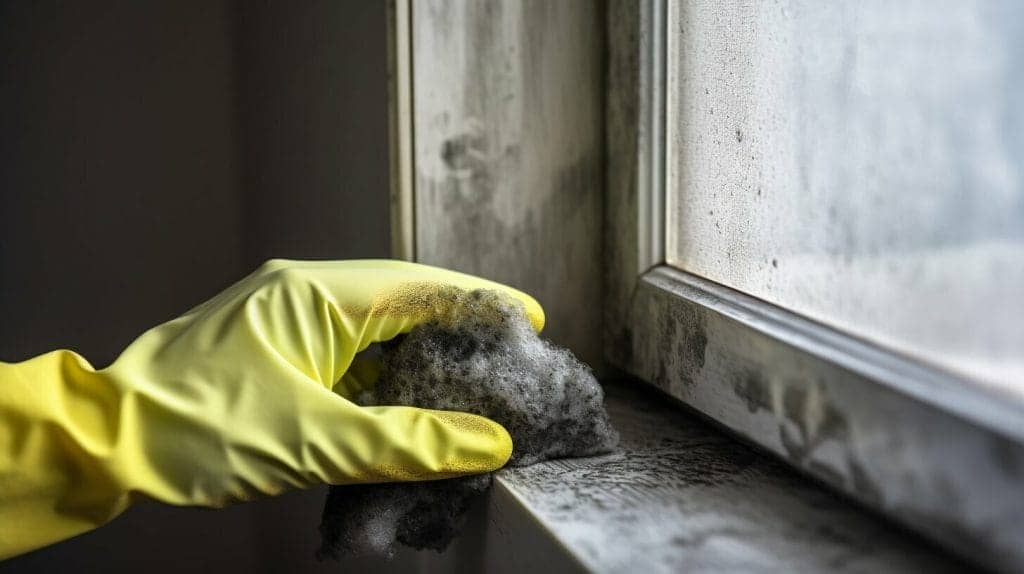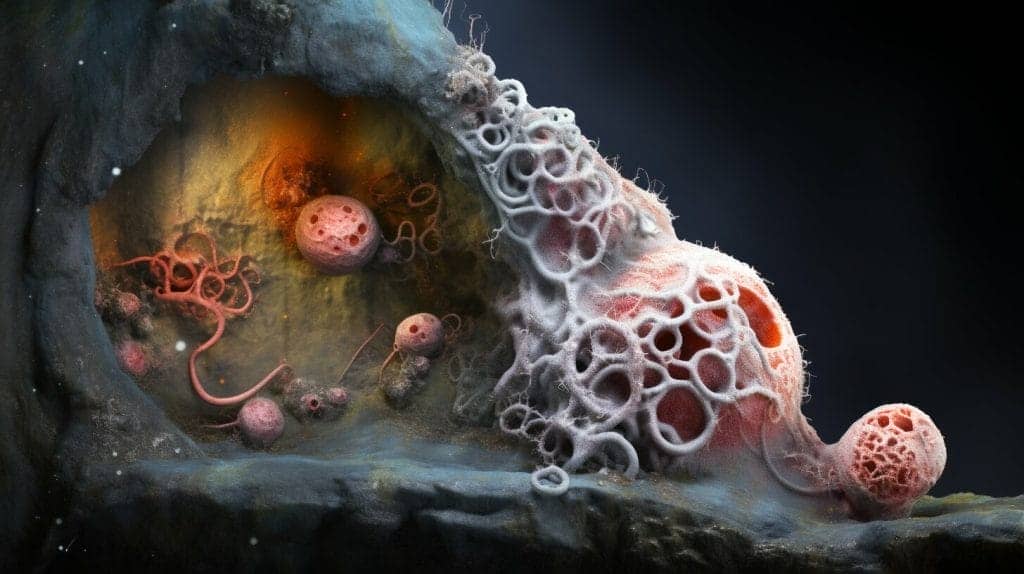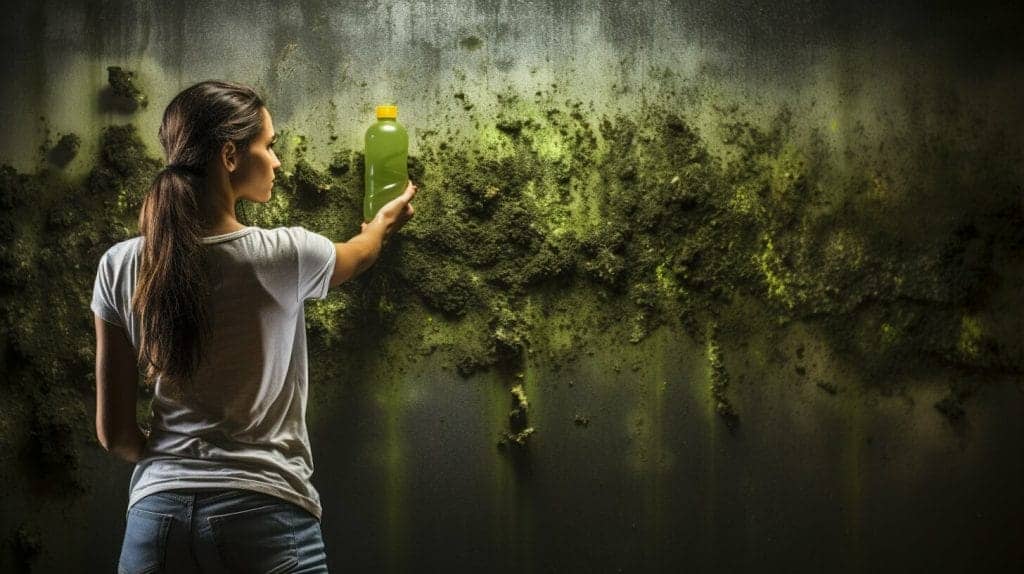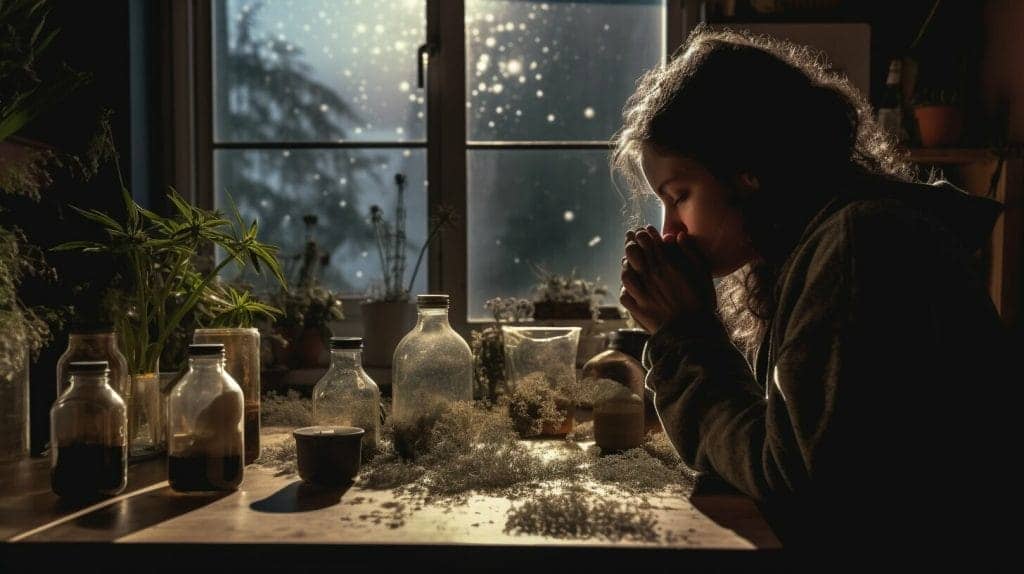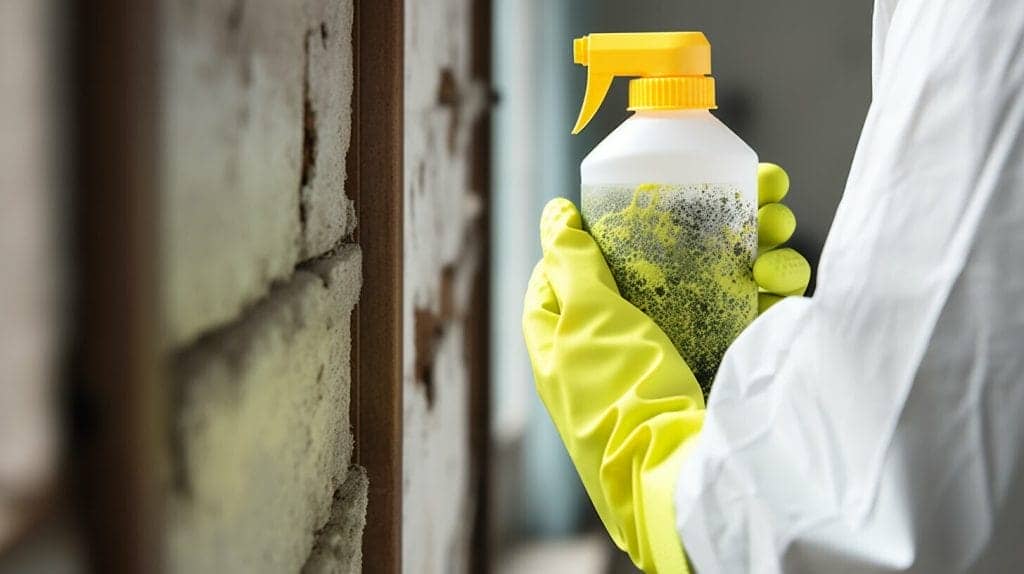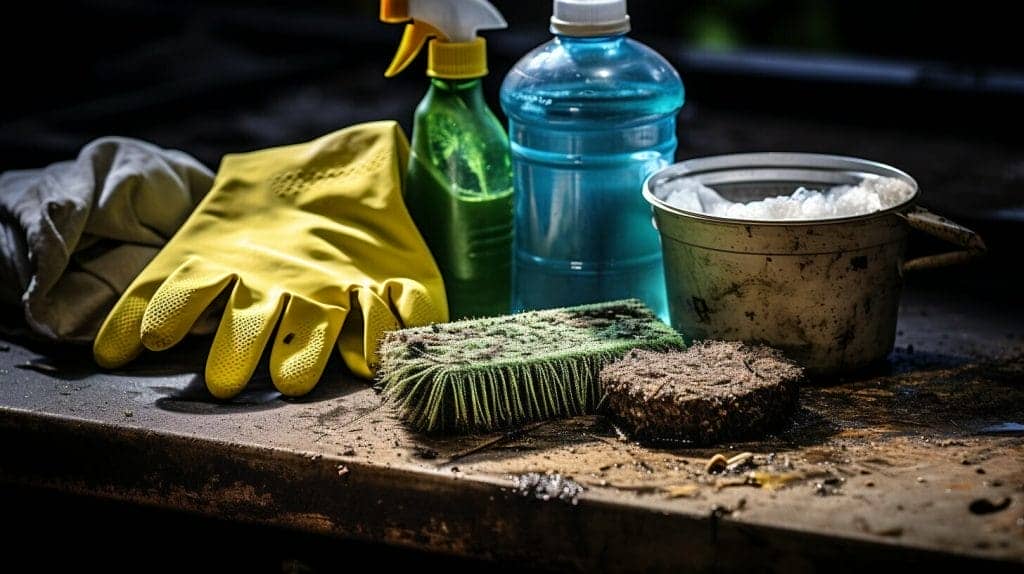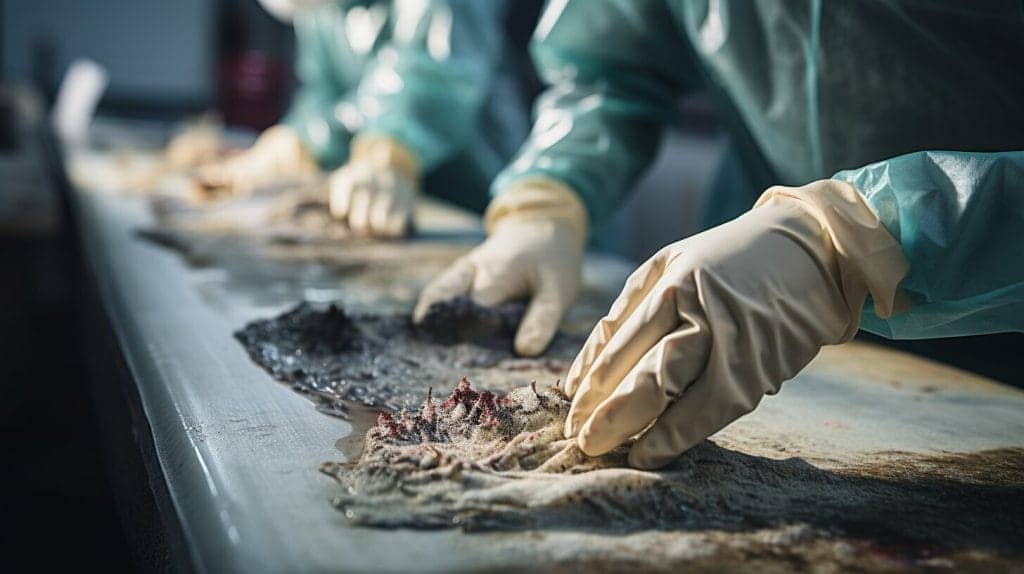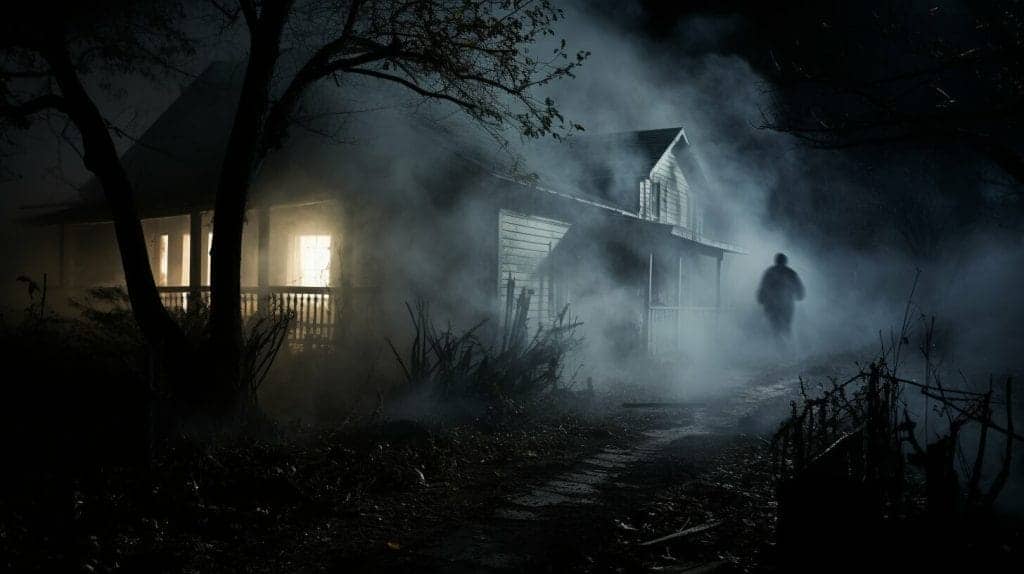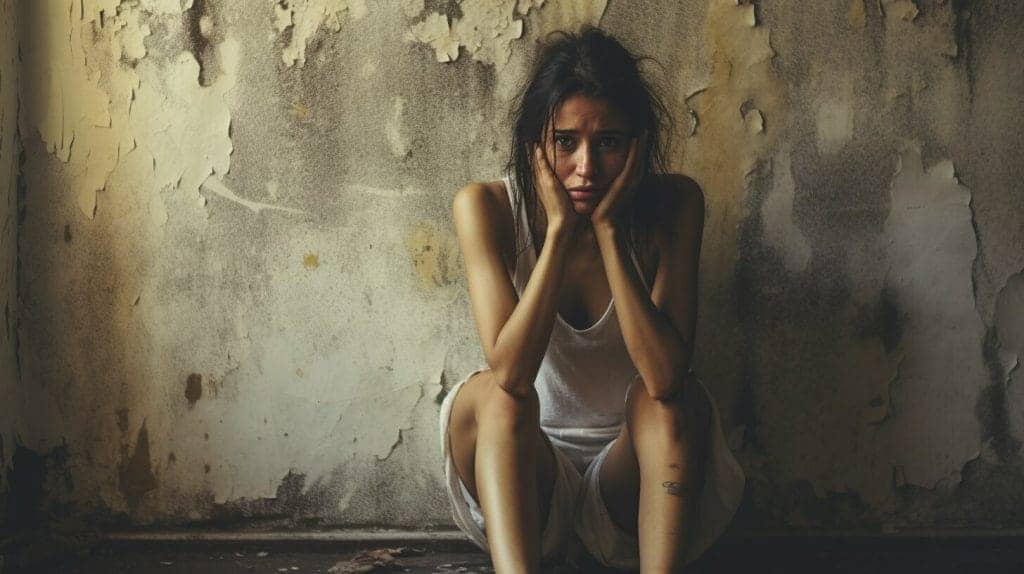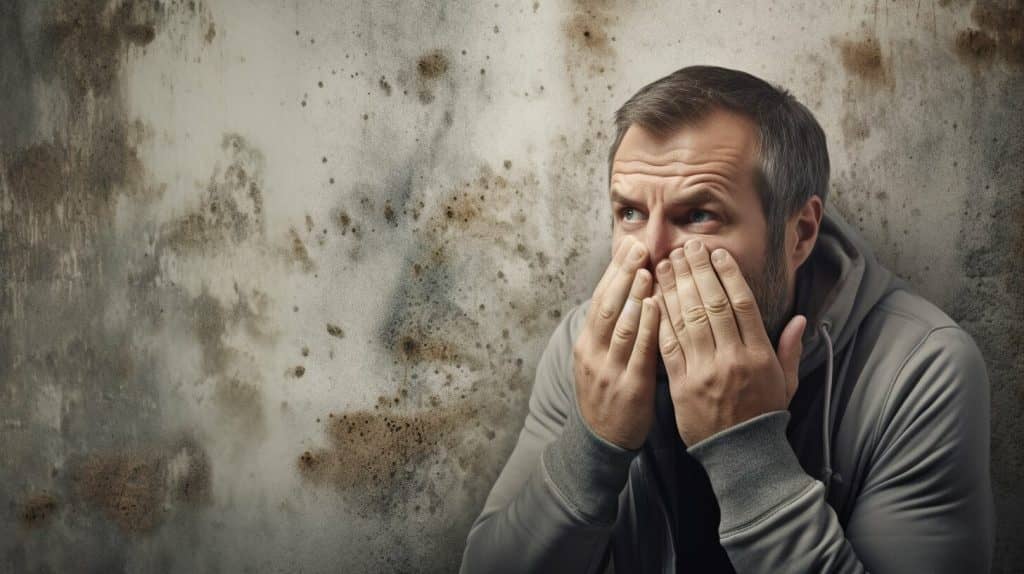Mold exposure can cause a range of health issues, including respiratory problems, allergies, and skin irritation. However, it can also affect the quality of sleep and lead to mold-induced insomnia. This sleep disorder can be particularly challenging to manage, as it requires not only addressing the underlying mold exposure but also implementing solutions to improve sleep health.
In this article, we will explore the various clinical interventions available for mold-induced insomnia and discuss practical strategies for improving sleep quality. We will also highlight the importance of seeking professional treatment and offer insights into the holistic mold toxicity treatment program available at Oasis Medical Institute in Tijuana, Mexico. Whether you are struggling to sleep due to mold exposure or simply looking to optimize your sleep health, this article will provide valuable insights and actionable tips.
Key Takeaways:
- Mold exposure can lead to sleep disturbances and mold-induced insomnia.
- Clinical interventions, lifestyle changes, and holistic treatments can all be effective in managing mold-related sleep disorders.
- It is important to seek personalized treatment from a medical professional for mold-induced insomnia.
- The holistic mold toxicity treatment program at Oasis Medical Institute in Tijuana, Mexico offers a comprehensive approach to addressing mold-related health issues.
Understanding Mold-Induced Insomnia
Mold exposure can have a significant impact on an individual’s sleep quality and quantity. When an individual is exposed to mold, spores can trigger an allergic reaction that can cause inflammation in the airways and lead to respiratory symptoms, such as wheezing, coughing, and shortness of breath. These symptoms can make it difficult for individuals to fall and stay asleep, leading to chronic sleep deprivation.
In addition to respiratory symptoms, mold exposure can also cause neurological symptoms that can further disrupt sleep patterns. Studies have shown that mold exposure can cause fatigue, headaches, and cognitive impairment, all of which can contribute to insomnia and other sleep disorders.
Understanding the Specific Sleep Disorders Associated with Mold Exposure
Mold exposure can lead to a variety of sleep disorders, including:
- Insomnia: Difficulty falling asleep, staying asleep, or waking up too early
- Obstructive Sleep Apnea: Interruptions in breathing during sleep due to airway obstruction
- Narcolepsy: Excessive daytime sleepiness and sudden sleep attacks
- Restless Leg Syndrome: Uncomfortable sensations and urge to move legs during sleep
- Periodic Limb Movement Disorder: Repetitive leg movements during sleep that cause disturbances
It is important to understand the specific sleep disorder that is associated with mold exposure in order to effectively treat the symptoms and address the underlying cause.
The Importance of Clinical Interventions
When it comes to mold-induced insomnia, seeking clinical interventions is essential for both short-term and long-term health outcomes. Untreated mold-related sleep disorders can result in a range of complications, including respiratory issues, cognitive impairments, and even chronic fatigue syndrome.
By seeking clinical interventions, individuals can receive personalized treatment plans that address their unique sleep health needs. Medical professionals can help identify the underlying causes of mold-induced insomnia, develop targeted interventions, and monitor the effectiveness of treatment over time.
Holistic Treatments at Oasis Medical Institute
Oasis Medical Institute in Tijuana, Mexico, offers a range of holistic treatments for mold-induced insomnia. Their integrative approach includes addressing the root cause of the mold exposure and the specific sleep disorders that arise as a result. The experienced medical team combines natural therapies with conventional medicine to help patients recover their health and well-being.
| Treatment | Description |
|---|---|
| Detoxification Therapies | Oasis Medical Institute offers various detoxification therapies that support the body’s natural detoxification mechanisms. These therapies may include colon hydrotherapy, ozone therapy, and intravenous vitamin C, among others. |
| Nutritional Support | Mold toxicity can deplete the body of essential nutrients, making nutritional support crucial for recovery. The medical team at Oasis Medical Institute offers a personalized nutritional plan to address each patient’s unique needs. |
| IV Therapies | Intravenous (IV) therapy can be an effective way to deliver nutrients and medications directly into the bloodstream. The medical team may use IV therapies to help patients recover from mold-induced insomnia and other related health issues. |
At Oasis Medical Institute, patients receive comprehensive care tailored to their individual needs. The team of doctors, nurses, and therapists work together to develop a personalized treatment plan that addresses all aspects of their health, including sleep quality and quantity.
The Role of Dr. Francisco Contreras MD
Dr. Francisco Contreras MD is a renowned expert in holistic medicine and the treatment of mold toxicity. He is the founder and director of Oasis Medical Institute in Tijuana, Mexico, where he leads a team of integrative medical professionals dedicated to providing personalized care for patients with complex health conditions.
As a pioneer in the field of holistic medicine, Dr. Contreras has developed a unique approach to treating mold toxicity and related health issues. His comprehensive Mold Toxicity treatment program combines cutting-edge medical interventions with natural therapies and lifestyle modifications to address the root causes of mold-related illnesses, including insomnia.
Dr. Contreras understands the importance of a holistic approach to health and wellness, and he emphasizes the role of nutrition, exercise, and stress management in promoting healthy sleep patterns. He works closely with each patient to create a customized treatment plan tailored to their unique needs and health goals.
Patients who work with Dr. Contreras can expect compassionate, expert care that focuses on the whole person, not just their symptoms. His commitment to excellence in patient care has earned him widespread recognition and numerous awards, including Top Doctor from the US News and World Report.
The Holistic Mold Toxicity Treatment Program
At Oasis Medical Institute, our team of experts has developed a comprehensive program to help individuals suffering from mold-related insomnia. Our Holistic Mold Toxicity Treatment Program combines cutting-edge medical interventions with natural remedies and alternative therapies to ensure complete and sustainable relief from mold-induced sleep issues.
The program consists of the following components:
| Component | Description |
|---|---|
| Diagnostic Evaluations | Comprehensive medical and laboratory analyses to identify specific mold toxins and their impact on the patient’s sleep health. |
| Medical Interventions | Advanced medical treatments to address mold toxicity and restore healthy sleep patterns, including allergy desensitization, intravenous vitamin therapy, and chelation therapy. |
| Natural Remedies | Customized diet plans, nutritional supplements, and herbal remedies to support the body’s natural healing processes. |
| Alternative Therapies | Relaxation techniques, acupuncture, massage therapy, and other holistic therapies to reduce stress, promote relaxation, and enhance sleep quality. |
| Lifestyle Modifications | Expert guidance on lifestyle changes to reduce exposure to mold toxins and improve overall sleep hygiene, including recommendations for exercise, sleep environment, and stress management. |
Our experienced team, led by renowned physician and author Dr. Francisco Contreras MD, works closely with each patient to identify the root causes of their mold-related sleep issues and create a customized treatment plan tailored to their unique needs. With a focus on holistic care and integrative medicine, we are dedicated to helping our patients achieve optimal sleep health and overall wellness.
The Importance of Clinical Interventions
It is crucial for individuals affected by mold-induced insomnia to seek clinical interventions as soon as possible. Mold exposure can cause a range of sleep disorders, including insomnia, sleep apnea, and restless leg syndrome, and if left untreated, can lead to more severe health complications.
By seeking clinical interventions, individuals can receive proper diagnosis and treatment for their mold-related sleep issues. Sleep specialists and medical professionals can provide a variety of interventions, including medication, therapy, and targeted treatments, to help individuals regain healthy sleep patterns and improve their overall sleep health.
Natural Remedies for Mold-Related Sleep Problems
In addition to seeking clinical interventions, individuals with mold-induced insomnia can also benefit from incorporating natural remedies into their sleep routines. These remedies can support better sleep quality and promote overall health and wellness.
Lifestyle Changes: Lifestyle changes can have a significant impact on sleep quality. Mold-exposed individuals can benefit from engaging in regular exercise, maintaining a healthy diet, avoiding stimulants such as caffeine and nicotine, and establishing a consistent sleep schedule.
Dietary Modifications: Certain foods can exacerbate mold-related symptoms and disrupt sleep. Individuals can benefit from eliminating processed foods, sugar, and alcohol from their diets and incorporating anti-inflammatory foods such as leafy greens, berries, and omega-3 rich fish.
Alternative Therapies: Alternative therapies such as acupuncture, massage therapy, and aromatherapy can promote relaxation and relieve stress, both of which can support better sleep.
While natural remedies can be effective, it is important for individuals with mold-related sleep issues to seek personalized treatment from a qualified healthcare provider.
Sleep Solutions for Mold-Exposed Individuals
For individuals experiencing mold-related sleep problems, making changes to their sleep environment and routine can be helpful in improving their quality of sleep. Below are some sleep solutions specifically tailored for mold-exposed individuals:
1. Improve sleep hygiene
Sleep hygiene refers to practices that promote good sleep quality and quantity. Mold-exposed individuals can benefit from improving their sleep hygiene by following these tips:
- Establish a consistent sleep schedule, going to bed and waking up at the same time every day
- Avoid electronics and screens before bedtime
- Create a relaxing bedtime routine
- Ensure the sleep environment is dark, cool, and quiet
2. Make bedroom modifications
Making modifications to the bedroom can help reduce exposure to mold and improve sleep quality. Consider the following:
- Invest in a good quality air purifier to reduce airborne mold spores
- Replace any moldy or water-damaged materials in the bedroom, such as bedding or curtains
- Use mold-resistant pillows and mattress covers
- Keep humidity levels below 50% with a dehumidifier
3. Try relaxation techniques
Relaxation techniques, such as deep breathing or progressive muscle relaxation, can help calm the mind and body, making it easier to fall asleep. Other techniques to try include:
- Yoga or gentle stretching
- Aromatherapy with essential oils
- Meditation or mindfulness
4. Consider alternative therapies
Alternative therapies such as acupuncture, massage, or chiropractic care may help mold-exposed individuals cope with stress and promote relaxation.
These sleep solutions can be effective in managing mold-related sleep problems. However, if symptoms persist, it is important to seek clinical interventions from a healthcare professional.
Effective Strategies to Manage Mold-Triggered Insomnia
Mold-induced insomnia can be a challenging condition to manage, but there are effective strategies that can help individuals overcome sleep disturbances caused by mold exposure. These strategies range from cognitive-behavioral techniques to stress reduction methods and evidence-based approaches that can promote healthy sleep patterns. Here are some strategies that can be helpful:
- Cognitive-behavioral therapy for insomnia (CBT-I): This therapeutic approach helps individuals identify negative thought patterns and behaviors that contribute to insomnia. CBT-I aims to replace these negative patterns with positive thoughts, feelings, and behaviors that promote healthy sleep.
- Mindfulness-based interventions: Mindfulness practices can help individuals keep their minds present and focused, reducing the racing thoughts that often keep them awake at night. Mindfulness-based interventions include deep breathing exercises, progressive muscle relaxation, and guided imagery.
- Sleep hygiene practices: Individuals should follow a consistent sleep schedule, avoid caffeine and alcohol before bed, and create a relaxing sleep environment free of distractions.
- Bedroom modifications: Keeping the bedroom clean, cool, and free of allergens can reduce the impact of mold on sleep health. This can include using air purifiers, hypoallergenic bedding materials, and keeping windows closed at night.
- Relaxation techniques: Relaxation techniques such as yoga, meditation, and deep breathing can help individuals reduce stress, anxiety, and other factors that contribute to insomnia.
By incorporating these strategies into their daily routines, individuals can manage mold-triggered insomnia and promote better sleep health overall. However, it’s important to note that if these techniques are not effective, seeking clinical interventions may be necessary.
Clinical Approaches for Addressing Mold-Induced Sleep Disturbances
When it comes to managing mold-induced insomnia, there are a variety of clinical approaches that can be effective. Medical professionals and sleep specialists often work together to create personalized treatment plans that address the unique needs of each patient. Here are some of the clinical approaches commonly used for addressing mold-induced sleep disturbances:
Medication
Medication can be helpful in managing the symptoms of mold-induced sleep disorders. Antihistamines, nasal corticosteroids, and decongestants can help alleviate allergy symptoms that often accompany mold exposure. Certain medications, such as sleep aids or antidepressants, may also be prescribed to improve sleep quality or address underlying anxiety or depression.
Allergy Treatments
Allergy treatments, such as allergy shots or sublingual immunotherapy, can help reduce the body’s sensitivity to mold and other allergens. By gradually exposing the body to small amounts of the allergen, these treatments can help desensitize the immune system and reduce the severity of allergy symptoms.
Cognitive Behavioral Therapy (CBT)
Cognitive-behavioral therapy (CBT) is a form of talk therapy that can be effective in treating mold-induced insomnia. By addressing negative thoughts and behaviors related to sleep, CBT can help individuals develop healthier sleep habits and improve their overall sleep quality.
Light Therapy
Light therapy is a technique that involves exposure to bright light to regulate the body’s natural sleep-wake cycle. This therapy can be effective in treating sleep disorders related to mold exposure, especially those that disrupt the body’s internal clock.
Sleep Restriction Therapy
Sleep restriction therapy involves limiting the amount of time spent in bed, with the goal of increasing the body’s natural drive to sleep. This therapy can be effective in treating mold-induced insomnia by helping to establish a regular sleep pattern.
Overall, clinical interventions can be an effective way of managing mold-induced sleep disturbances. By working with medical professionals and sleep specialists, individuals can develop personalized treatment plans that address their unique needs and help them achieve better sleep health.
Therapeutic Techniques for Mold-Related Insomnia
Individuals with mold-induced insomnia can benefit from various therapeutic techniques that can help them regain healthy sleep patterns. One effective treatment is cognitive-behavioral therapy for insomnia (CBT-I), which aims to change negative thoughts and behaviors around sleep. This therapy involves identifying negative sleep patterns and addressing them through relaxation techniques, sleep restriction, and stimulus control.
Another therapeutic technique that can be useful for people with mold-related insomnia is mindfulness-based stress reduction (MBSR). This therapy involves training the mind to focus on the present moment, which can help reduce stress and anxiety levels that may be contributing to sleep disturbances. MBSR also incorporates relaxation techniques such as breathing exercises and meditation, which can further promote better sleep quality.
Other specialized treatments that can help individuals with mold-related insomnia include biofeedback and hypnotherapy. Biofeedback involves using electronic devices to measure bodily processes, such as heart rate and muscle tension, and then training the individual to control these processes through relaxation and visualization techniques. Hypnotherapy involves inducing a state of deep relaxation and then using suggestion to help the individual overcome negative thoughts and behaviors around sleep.
It is important for individuals with mold-induced insomnia to work with a qualified healthcare professional to determine which therapeutic technique is best suited for their specific needs. By seeking personalized care, individuals can effectively address their mold-related sleep issues and improve their overall sleep health.
The Role of Mold-Related Sleep Therapies
In addition to clinical and medical interventions, mold-related sleep therapies can be effective in managing sleep disturbances caused by mold exposure. These specialized interventions are designed to address the specific sleep disorders that can arise as a result of mold toxicity.
Sleep Restriction Therapy
Sleep restriction therapy is a behavioral intervention that limits the amount of time spent in bed to increase sleep efficiency and reduce sleep fragmentation. This therapy can be effective in treating insomnia caused by mold exposure, as it helps to create a consistent sleep schedule and improve overall sleep quality.
Light Therapy
Light therapy involves exposure to bright, artificial light to regulate circadian rhythms and improve sleep/wake patterns. This therapy can be especially helpful for individuals with mold-related sleep issues, as it can help to reset the body’s internal clock and promote better sleep.
Other Targeted Treatments
In addition to sleep restriction therapy and light therapy, other targeted treatments may be used to address specific sleep disorders caused by mold exposure. These may include cognitive-behavioral therapy for insomnia (CBT-I), relaxation training, and sleep hygiene education.
The Medical Interventions for Mold-Induced Sleep Issues
For individuals experiencing mold-induced insomnia, medical interventions may be necessary to manage sleep disturbances. This section will explore various medical approaches that can be effective in alleviating symptoms of mold-related sleep disorders.
Allergy Medications
For individuals experiencing allergic reactions to mold, allergy medications such as antihistamines can be helpful in reducing symptoms such as nasal congestion, runny nose, and itching. However, these medications may not directly address sleep disturbances and can have side effects such as drowsiness or dry mouth.
Prescription Sleep Aids
In some cases, prescription sleep aids may be used to manage mold-induced insomnia. These medications can help individuals fall asleep faster and stay asleep longer. However, they can also have side effects such as daytime drowsiness, dizziness, and nausea. Additionally, they should only be used under the guidance of a healthcare professional and for a limited time due to the risk of dependency.
Allergy Shots
For individuals with severe allergies to mold, allergy shots (also known as immunotherapy) may be recommended. These shots contain small amounts of mold allergens that can help desensitize the immune system over time. While this can be effective in reducing allergic reactions, it may take several months or years to see significant improvement in sleep disturbances.
Nasal Steroids
Nasal steroids are another medication that can be used to manage mold allergies and reduce symptoms such as nasal congestion and inflammation. While they may not directly address sleep disturbances, they can improve overall respiratory health and may indirectly benefit sleep quality.
Conclusion
Medical interventions can be an effective treatment option for individuals experiencing mold-induced insomnia. However, it is important to work with a healthcare professional to determine the most appropriate approach and to monitor potential side effects. Additionally, medical interventions may be most effective when combined with holistic treatments and lifestyle modifications.
Conclusion
In conclusion, mold-induced insomnia can significantly impact an individual’s sleep health and overall well-being. Seeking clinical interventions for mold-related sleep disorders is crucial for managing symptoms and reducing potential risks and complications.
Oasis Medical Institute provides holistic treatments that address the root causes of mold toxicity, offering integrative care that promotes optimal sleep health. Booking a consultation with their team can help individuals receive personalized treatment that meets their unique needs.
Take Action for Better Sleep Health
It’s essential to prioritize sleep health and take proactive steps to manage mold-related sleep issues. Incorporating natural remedies, implementing sleep hygiene practices, and seeking clinical interventions can all be effective strategies for managing mold-induced insomnia.
If you’re struggling with mold-induced sleep disturbances, consider consulting with a sleep specialist or medical professional to explore treatment options that address your unique needs. With the right approach and support, individuals can regain healthy sleep patterns and enjoy better overall health and well-being.
FAQ
Q: What is mold-induced insomnia?
A: Mold-induced insomnia refers to sleep disturbances that are caused by exposure to mold. Mold spores can trigger allergic reactions and other respiratory issues, leading to difficulty falling asleep, staying asleep, and getting restful sleep.
Q: How does mold exposure affect sleep?
A: Mold exposure can disrupt sleep patterns by causing respiratory symptoms such as coughing, sneezing, and congestion. These symptoms can make it difficult to breathe properly and can lead to frequent awakenings throughout the night.
Q: What are the symptoms of mold-induced insomnia?
A: Symptoms of mold-induced insomnia may include difficulty falling asleep, waking up frequently during the night, snoring, daytime fatigue, headaches, and respiratory problems. If you suspect mold exposure is affecting your sleep, it is important to consult a healthcare professional.
Q: What are some clinical interventions for mold-induced insomnia?
A: Clinical interventions for mold-induced insomnia may include allergy treatments, medication, cognitive-behavioral therapy for insomnia (CBT-I), and other specialized therapies. It is recommended to seek professional guidance to determine the most suitable intervention for your specific situation.
Q: Can holistic treatments help with mold-induced insomnia?
A: Yes, holistic treatments can be effective in managing mold-induced insomnia. Techniques such as lifestyle changes, dietary modifications, relaxation techniques, and alternative therapies can help improve sleep quality and reduce the impact of mold exposure on sleep.
Q: How can I book a consultation with Oasis Medical Institute?
A: To book a consultation with Oasis Medical Institute for mold-induced insomnia or mold-related sleep disorders, you can contact them at [Phone number] or [Email address]. They will provide personalized treatment options based on your individual needs and situation.
Q: What are some natural remedies for mold-related sleep problems?
A: Natural remedies for mold-related sleep problems may include improving indoor air quality, using air purifiers, implementing mold prevention strategies, practicing good sleep hygiene, and incorporating relaxation techniques such as meditation or aromatherapy into your bedtime routine.
Q: Are there specific sleep solutions for mold-exposed individuals?
A: Yes, there are specific sleep solutions that can help mold-exposed individuals improve their sleep. These may include creating a clean and allergen-free sleep environment, using hypoallergenic bedding and mattress covers, and managing humidity levels in the bedroom.
Q: What are some effective strategies to manage mold-triggered insomnia?
A: Effective strategies to manage mold-triggered insomnia may include stress reduction techniques, cognitive-behavioral therapy, implementing a consistent sleep schedule, practicing relaxation exercises before bed, and creating a bedtime routine that promotes relaxation and calmness.
Q: What are some clinical approaches for addressing mold-induced sleep disturbances?
A: Clinical approaches for addressing mold-induced sleep disturbances may involve the use of medications to alleviate symptoms, therapy to address any underlying mental health issues, and interventions such as allergy treatments or respiratory therapies to reduce the impact of mold on sleep.
Q: What therapeutic techniques can be effective in managing mold-related insomnia?
A: Therapeutic techniques such as cognitive-behavioral therapy for insomnia (CBT-I), mindfulness-based interventions, and sleep restriction therapy can be effective in managing mold-related insomnia. These techniques aim to improve sleep hygiene, regulate sleep patterns, and address any psychological factors impacting sleep.
Q: What are some mold-related sleep therapies?
A: Mold-related sleep therapies may include sleep restriction therapy, light therapy, and other targeted treatments that focus on improving sleep quality and quantity in individuals affected by mold exposure. These therapies can be conducted under the guidance of sleep specialists or healthcare professionals.
Q: What medical interventions are available for mold-induced sleep issues?
A: Medical interventions for mold-induced sleep issues may include the use of allergy medications, nasal sprays, or other respiratory treatments to alleviate symptoms. It is important to consult with a healthcare professional to determine the most appropriate medical intervention for your specific situation.
Dr. Francisco Contreras, MD is a renowned integrative medical physician with over 20 years of dedicated experience in the field of integrative medicine. As the Medical Director of the Oasis of Hope Hospital in Tijuana, Mexico, he has pioneered innovative treatments and integrative approaches that have been recognized globally for the treatment of cancer, Lyme Disease, Mold Toxicity, and chronic disease using alternative treatment modalities. Dr. Contreras holds a medical degree from the Autonomous University of Mexico in Toluca, and speciality in surgical oncology from the University of Vienna in Austria.
Under his visionary leadership, the Oasis of Hope Hospital has emerged as a leading institution, renowned for its innovative treatments and patient-centric approach for treating cancer, Lyme Disease, Mold Toxicity, Long-Haul COVID, and chronic disease. The hospital, under Dr. Contreras's guidance, has successfully treated thousands of patients, many of whom traveled from different parts of the world, seeking the unique and compassionate care the institution offers.
Dr. Contreras has contributed to numerous research papers, articles, and medical journals, solidifying his expertise in the realm of integrative medicine. His commitment to patient care and evidence-based treatments has earned him a reputation for trustworthiness and excellence. Dr. Contreras is frequently invited to speak at international conferences and has been featured on CNN, WMAR2 News, KGUN9 News, Tyent USA, and various others for his groundbreaking work. His dedication to the medical community and his patients is unwavering, making him a leading authority in the field.
Contreras has authored and co-authored several books concerning integrative therapy, cancer, Lyme Disease and heart disease prevention and chronic illness, including "The Art Science of Undermining Cancer", "The Art & Science of Undermining Cancer: Strategies to Slow, Control, Reverse", "Look Younger, Live Longer: 10 Steps to Reverse Aging and Live a Vibrant Life", "The Coming Cancer Cure Your Guide to effective alternative, conventional and integrative therapies", "Hope Medicine & Healing", "Health in the 21st Century: Will Doctors Survive?", "Healthy Heart: An alternative guide to a healthy heart", “The Hope of Living Cancer Free”, “Hope Of Living Long And Well: 10 Steps to look younger, feel better, live longer” “Fighting Cancer 20 Different Ways”, "50 Critical Cancer Answers: Your Personal Battle Plan for Beating Cancer", "To Beat . . . Or Not to Beat?", and “Dismantling Cancer.”




